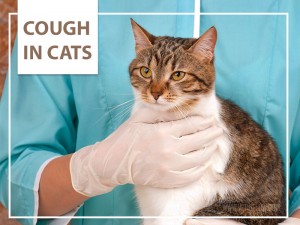
Cough in cats

Many cat owners have probably seen their cat cough and wondered if that was just an occasional cough or if there was something else to it. It is normal for cats to cough every now and then, as there is always something in their environment that can irritate their airways and cause them to cough. It is also not uncommon for cat owners to mistake retching, a sound that cats often produce when they regurgitate hairballs with cough.
If a cat's cough seems to persist, if it becomes severe, productive or if you notice your cat starts showing other clinical signs such as being depressed or lack of appetite, then it is time to take your cat to the vet.
There are several different causes of cough in our feline companions: a foreign body lodged in their air passages, pulmonary parasites, bacterial or viral infections (cat flu for example), heart disease and the most common cause, feline asthma.
Feline asthma, chronic bronchitis, or allergic airway disease is usually triggered when cats inhales any substance that causes irritation in their airways. This means that feline asthma can be caused by common household cleaning sprays, dust, mould, pollens, cat litter dust, cigarette smoke and even perfume.
When these substance are inhaled they will travel through the cat's bronchial tree and not only there is contraction of the muscle that lines the bronchial tree but also mucous starts being produced to trap these agents and prevent them from advancing further into the cat's lungs. All these reactions will trigger cough which basically tries to get rid of the mucous containing the irritating substances.
The continuous irritation of the cat's airways will result in the narrowing of those airways. This is why if your cat seems unwell and shows persistent cough it is very important to seek veterinary assistance. Some cats are just mildly affected, but others can develop more serious clinical signs. If left untreated the problem then becomes chronic and the narrowing of the cat's airways is irreversible. The cat can have breathing difficulties and that the disease can be fatal.
Would you like to know more about cats? Check our Feline Courses:
Feline courses
Published: 27 Nov 2015
Read the previous article: Head shaking in horses

